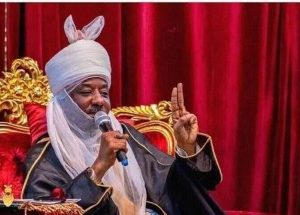
The 16th Emir of Kano, Muhammadu Sanusi II, has said that Alhaji Aliko Dangote should not be blamed for buying dollars at lower rates at the time he was building his refinery because that was the actual rate the apex bank was selling to everybody at that time.
Sanusi, who commented on the issue through SOP Chat Group, initially said: “I honestly do not think it is a good idea for me to make comments on these issues, but some comments surprise me, and I just have to say something.”
The emir then went on to remark: “Aliko Dangote did not fix the price at which the CBN sold dollars. Everyone who got dollars from the CBN got dollars at the same rate if they bought on the same day. So we cannot blame him for buying dollars at a rate the CBN itself decided to sell to its customers.
“So the question for me is this. Let us forget the man Dangote. If the Central Bank were to prioritize a single enterprise for forex allocation, how many enterprises can we think of that are worthier than a refinery like this one?
“Consider the drain on our forex from importing petroleum products; the tens of billions of dollars of forex spent abroad; the huge losses due to theft in the name of subsidy.
“By the way, how much forex did Dangote buy from the CBN at this subsidized rate? How much forex did NNPC take from the federation account in the same year in the name of running and turning around its dead refineries? What are we benchmarking against?
“If any Nigerian came to me as a Central Bank Governor with a project like this refinery, I would recognize immediately its potential impact on the economy and give it all the support needed.
“Let our views on forex policies not becloud our sense of priorities. Once the CBN decided to sell dollars at the below market, it would be forced to ration the limited dollars available.”
“To my mind, giving dollars for the construction of a refinery is better than rice importers and, indeed, almost every other enterprise apart from education and health, given the impact on the macro.”
On the argument by NNPC that relying on one refinery is bad for our energy security, Muhammadu Sanusi II said: “This is most laughable. On the contrary, relying on a local refinery is far more secure than these imports.
“It is a very rich argument from an entity that had taken billions of dollars in the name of turnaround maintenance and not produced a drop of product from four refineries because it is more profitable to continue extracting rent in the name of subsidy. If NNPC activated its refineries, there would be no monopoly. Then, we can see the sulphur content of its products and compare them to Dangote’s.”
He said further: “Until then, keeping quiet is the honourable option for it, NNPC and its spinoffs have lost any right to talk until they fix the mess they have thrown us into.
“In any case, if the Dangote refinery is unable to meet local demand, the gap can be filled by imports, these people in NNPC do not want to end their lucrative subsidy scam, and I don’t think they will end it.
” But as a nation, if we do not thank Dangote for what he has done as an African to deal a hammer blow to multinationals and the rentier system and for structural change in this economy through value added in various sectors, we should not condemn him.
“Also, we tend to repeat stories without evidence. We hear about Dangote getting favourable taxation but no one has said what this tax is, if he got it alone or if it was offered to a sector or to pioneers, and if such a practice is in fact normal to encourage investment.”
The emir concluded thus: “Instead of killing Dangote, we should try and make more like him. Nigeria always kills its heroes and its best because of envy and pettiness.”
Source:- Dailypostng


Share your thoughts